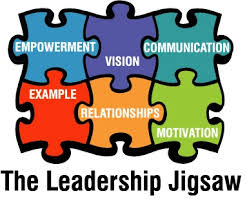Leadership Matters!
|
School leaders have many roles and responsibilities. They might be district or building administrators, instructional coaches, or teacher leaders. Leaders that continue to learn, promote improvement in themselves and others, and utilize collaboration to inform and improve practice, tend to be the most successful. They build relationships, inspire, and nurture the educators and students with whom they work.
|
Effective Leaders...

Effective leaders recognize that they cannot do everything themselves. As Jim Collins once wrote, "First get the right people on the bus and build a superior executive team. Once you have the right people in place, figure out the best path to greatness." No where did he say, do it all by yourself. In fact leaders who surround themselves with great people and effectively utilize the strengths of those people get far more accomplished than a "genius leader with a thousand helpers."
Effective leaders continue to learn and promote a learning environment. School leaders must understand what good teaching and learning looks like and all of the things that go into producing effective instruction that leads to student success. That requires administrators to keep learning! Consider this article from Gene Bottoms, founding director of High Schools that Work: What Principals Need to Know about Curriculum and Instruction.
Learning Forward, the nation's professional learning organization, offers that leadership is important in the process of producing effective instruction. "Skillful individuals have the ability to develop capacity, advocate for, and create support systems for effective professional learning. This involves articulating goals, setting expectations, providing resources and time to ensure quality implementation." They have produced The Principal's Story, a leadership guide to help school leaders understand the importance of their role in creating a teaching and learning environment in their school.
Effective leaders build relationships. Relationships matter. The old saying goes "no one cares what you know until they know that you care" is often quoted in educational circles about teachers. But the same can be said for school leaders too. Establishing strong respectful, working relationships improve the trust and communication of the work place. It's not about touchy-feely. It's about respect for the individual and being treated like you'd like to be treated. Kathy Rapp, from a professional service firm, offers some simple advice in her article on building relationships. Read more...
Effective leaders have a service attitude. It's not about you. Servant leaders think of others first and constantly work to help others win. (from The Heart of Leadership by Mark Miller). Being a servant leader doesn't mean you do the work for them. It means you think of how things affect others. It means you enable success for others. If the leader builds the capacity of others, everyone wins. Miller goes on to capture the strategies of a servant leader with the following acronym:
Effective leaders coach and are coachable. They provide feedback and work to facilitate improvement in themselves and others. Improved feedback leads to improved teaching and improved student results. Read more here about Tennessee Principals who receive coaching on observing teachers and providing feedback.
Effective leaders collaborate. Leaders who value human capital are inclusive in decision making, gain greater buy in from stakeholders and have the benefit of new or refinement of ideas from the perspectives of others. Working together to analyze data, generate ideas, strategize, solve problems, implement desired changes, and reflect on the effectiveness of policies and practices builds trust and ownership and collective responsibility. The leader's role is to ensure meaningful conversations about teaching and learning are occurring and that you, as the leader, are also participating in those conversations. "By participating in the meetings, you demonstrate your commitment to your staff and to the overall growth of your school." (The Principal 50, Baruti K. Kafele)
Effective leaders continue to learn and promote a learning environment. School leaders must understand what good teaching and learning looks like and all of the things that go into producing effective instruction that leads to student success. That requires administrators to keep learning! Consider this article from Gene Bottoms, founding director of High Schools that Work: What Principals Need to Know about Curriculum and Instruction.
Learning Forward, the nation's professional learning organization, offers that leadership is important in the process of producing effective instruction. "Skillful individuals have the ability to develop capacity, advocate for, and create support systems for effective professional learning. This involves articulating goals, setting expectations, providing resources and time to ensure quality implementation." They have produced The Principal's Story, a leadership guide to help school leaders understand the importance of their role in creating a teaching and learning environment in their school.
Effective leaders build relationships. Relationships matter. The old saying goes "no one cares what you know until they know that you care" is often quoted in educational circles about teachers. But the same can be said for school leaders too. Establishing strong respectful, working relationships improve the trust and communication of the work place. It's not about touchy-feely. It's about respect for the individual and being treated like you'd like to be treated. Kathy Rapp, from a professional service firm, offers some simple advice in her article on building relationships. Read more...
Effective leaders have a service attitude. It's not about you. Servant leaders think of others first and constantly work to help others win. (from The Heart of Leadership by Mark Miller). Being a servant leader doesn't mean you do the work for them. It means you think of how things affect others. It means you enable success for others. If the leader builds the capacity of others, everyone wins. Miller goes on to capture the strategies of a servant leader with the following acronym:
- See the Future
- Engage and Develop Others
- Reinvent Continuously
- Value Results and Relationships
- Embody the Values
Effective leaders coach and are coachable. They provide feedback and work to facilitate improvement in themselves and others. Improved feedback leads to improved teaching and improved student results. Read more here about Tennessee Principals who receive coaching on observing teachers and providing feedback.
Effective leaders collaborate. Leaders who value human capital are inclusive in decision making, gain greater buy in from stakeholders and have the benefit of new or refinement of ideas from the perspectives of others. Working together to analyze data, generate ideas, strategize, solve problems, implement desired changes, and reflect on the effectiveness of policies and practices builds trust and ownership and collective responsibility. The leader's role is to ensure meaningful conversations about teaching and learning are occurring and that you, as the leader, are also participating in those conversations. "By participating in the meetings, you demonstrate your commitment to your staff and to the overall growth of your school." (The Principal 50, Baruti K. Kafele)
"The more effective a school leader is the higher his or her students will soar."
- Baruti K. Kafele, author of the Principal 50 and leadership consultant
Helping Leaders Lead
Networking and utilizing resources that are accessible from your office, desk, or personal electronic device are important for busy school leaders. In this section Teaching and Learning Consulting Network highlights some articles and blogs that could be useful in terms of relevant content, ideas, strategies, or actions that will increase the effectiveness for you or your leadership team.
|
ARTICLES & RESOURCES
To help Educational Leaders go from KNOWING to DOING The Principal-Leader Checklist developed by Steven Weber is a quick guide to help principals ensure they are able to keep up with the constant changes occurring in education today. He addresses the areas of assessment, collaboration, implementation, the promotion and development of future leaders, instructional shifts, and continuous learning (by using Twitter). TO-BE List for Aspiring Women Leaders by Angela Maiers, educator, author and speaker. This is a worthy list of beliefs and behaviors that ALL leaders (regardless of gender) should consider as they consider how to lead and how they are as a leader. As Maiers points out, "Success in leadership is attributed not only to what you do; but it is dependent on who you are. We often set young leaders up to fail if we have them envision what they can do before first considering what kind of leader they want to be." Communication That Energizes During Tough Times by Rebecca Hipps featured in ASCD Express. Consider these 3 simple ways to connect with and support staff during challenging times. Change happens frequently. How we prepare for those changes and act during the implementation of those changes makes all the difference. Show & Tell: A Video Column/Laying the Groundwork for Teacher Feedback by Doug Fisher and Nancy Frey. Educator evaluations are required, but also often dreaded by both the principal and the teacher. How can we make them more effective in terms of receiving feedback to improve practice instead of being viewed as "gotcha?" This ASCD article and video might help start that conversation. |
BLOGS & RESOURCES
To THINK about one's own Beliefs and Practices as an Educational Leader. Wanted: A Great Principal - An Open Letter to Principal Applicants written by Jessica Keigan. The skills and behaviors outlined in this blog/letter speak to the kind of leadership that most students and educators would like to see in their building principal. Would you want to work in this school? Could you measure up? How can we help get all building leaders to this level of effectiveness and impact? Center for Quality Teaching (CTQ) This website is dedicated to networking educators to improve teaching and learning by "connecting, readying, and mobilizing teacher leaders to transform our schools." Lots of great bold ideas and innovative resources from expert educators can be found within this site. Leadership Freak by Dan Rockwell. Subscribers to Dan's daily blog (in 300 words or less) receive quick and useful ideas to consider in terms of how leadership can have a greater impact and be more effective. The opportunities for learning and meaningful connections increase if you take the time to read the comments each time too! Diane Ravich's Blog is a site dedicated to discussing better education for all. Topics are wide ranging and discussed in a concise and thought-provoking manner. The Wallace Foundation: Working to help create great school leaders to turn around failing schools. The resources on this site and the work of the Wallace Foundation are focused on helping to train, hire, support and evaluate principals and other key figures in schools. |

